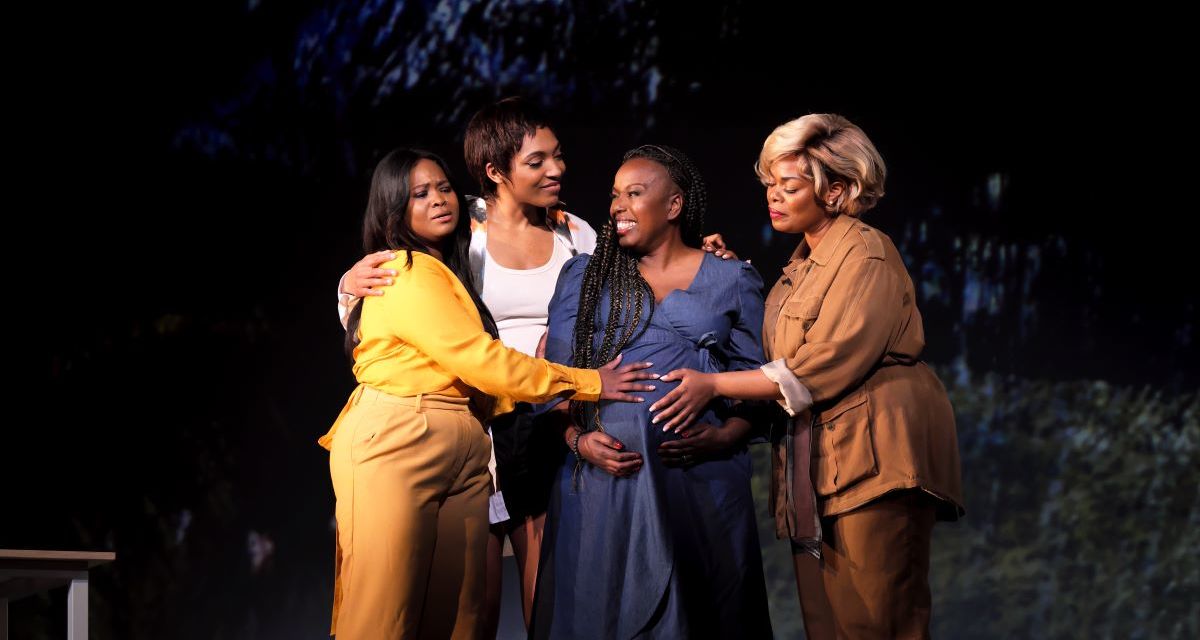Receiving its UK premiere just days after the shooting of 16-year-old Ralph Yarl after he knocked on the wrong door when picking up his siblings, Blue feels horribly timely. It tells the story of an African-American family torn apart by violence and institutional racism.
The opera opens with a Black man changing into his NYC police officer’s uniform, setting the scene for the coming conflict. Then we cut to a more lighthearted scene. A woman – The Mother – is telling her three girlfriends about her new husband – The Father – and pregnancy.
They are supportive but shocked when they learn the husband is a cop and the baby is a boy. It’s a mistake to bring Black boys into this world, they warn. This is contrasted with the excitement – and jealousy – of The Father’s police officer friends when they learn that he is the proud father of a son.
Fast forward 16 years and The Son is now a moody teenager, at odds with his father’s job as a cop. Or law enforcement officer, as The Father keeps insisting. The boy bitterly describes his father as “the white man’s dog”.
The second Act opens with a (sadly predictable) tragedy and a family and community in mourning. It closes with a flashback providing further insight into the family’s life and how the tragedy came about. At first I wasn’t sure about this reversal of time – why didn’t this scene open the act? But as it all played out, it made perfect sense, allowing the opera to close on a particularly poignant moment.
Blue is an important opera, tackling a huge and devastating topic that we need to address. It features an all-Black cast and a libretto from Tazewell Thompson, a Black theatre director and playwright. It’s also an exceptionally good opera – powerful, moving, funny, heartbreaking and at times very uncomfortable to watch.
Librettos are often overlooked in opera, but Thompson’s is excellent. The language is poetic and provides a solid framework for the music. The composer is Jeanine Tesori, who is better known for her work in musical theatre. This background can be heard in the music, along with influences from jazz, soul, blues and gospel. This mix works well – always serving the opera and the story. It really comes into its own in the second Act, underpinning the grief and trauma of violence and loss.
The performers are all outstanding. British soprano and former ENO Harewood Artist Nadine Benjamin is The Mother, a role she fully inhabits. Her voice is terrific: powerful and passionate with a beautiful vocal tone.
American bass-baritone Kenneth Kellogg makes his ENO debut as The Father. He combines strength and sensitivity. Standout moments come when he first meets his baby son and when confronting The Reverend in the second Act, after his devastating loss. His voice is rich, resonant and expressive.
American soprano Chanáe Curtis deserves special mention for her comic turn in a secondary role of The Nurse – she also sings the part of Girlfriend 1. Her overly enthusiastic coloratura as she brings baby into the new parents is truly laugh-out-loud funny.
South African tenor Zwakele Tshabalala is by turns vulnerable, angry, headstrong and youthful. His voice is wonderfully clear and powerful. A current ENO Harewood Artist, this young singer is definitely going places.
Tinuke Craig’s direction is tight and effective. The staging is simple, centring the characters’ emotional journeys. The result is both affective and affecting. Alex Lowde’s set is also simple, reducing the Coliseum’s stage to a revolving rectangle inside a circle, all framed within neon blue lights. Projections mark out the different settings of home, hospital, church and so on.
Blue is a powerful, moving and relevant opera that deserves to be seen widely. It’s on at the Coliseum until 4 May. Tickets are available now.
Image
The Mother’s three Girlfriends celebrate her pregnancy in Jeanine Tesori and Tazewell Thompson’s Blue; from left: Chanáe Curtis, Idunnu Münch, Nadine Benjamin and Sarah-Jane Lewis (Zoe Martin).

